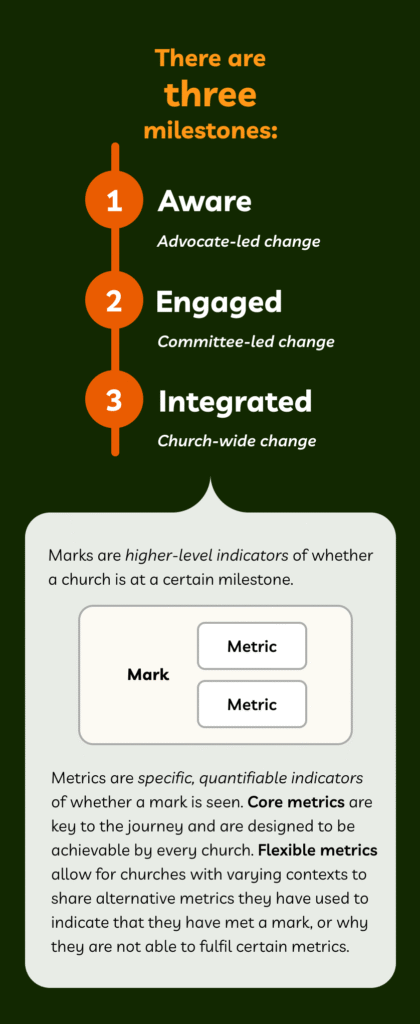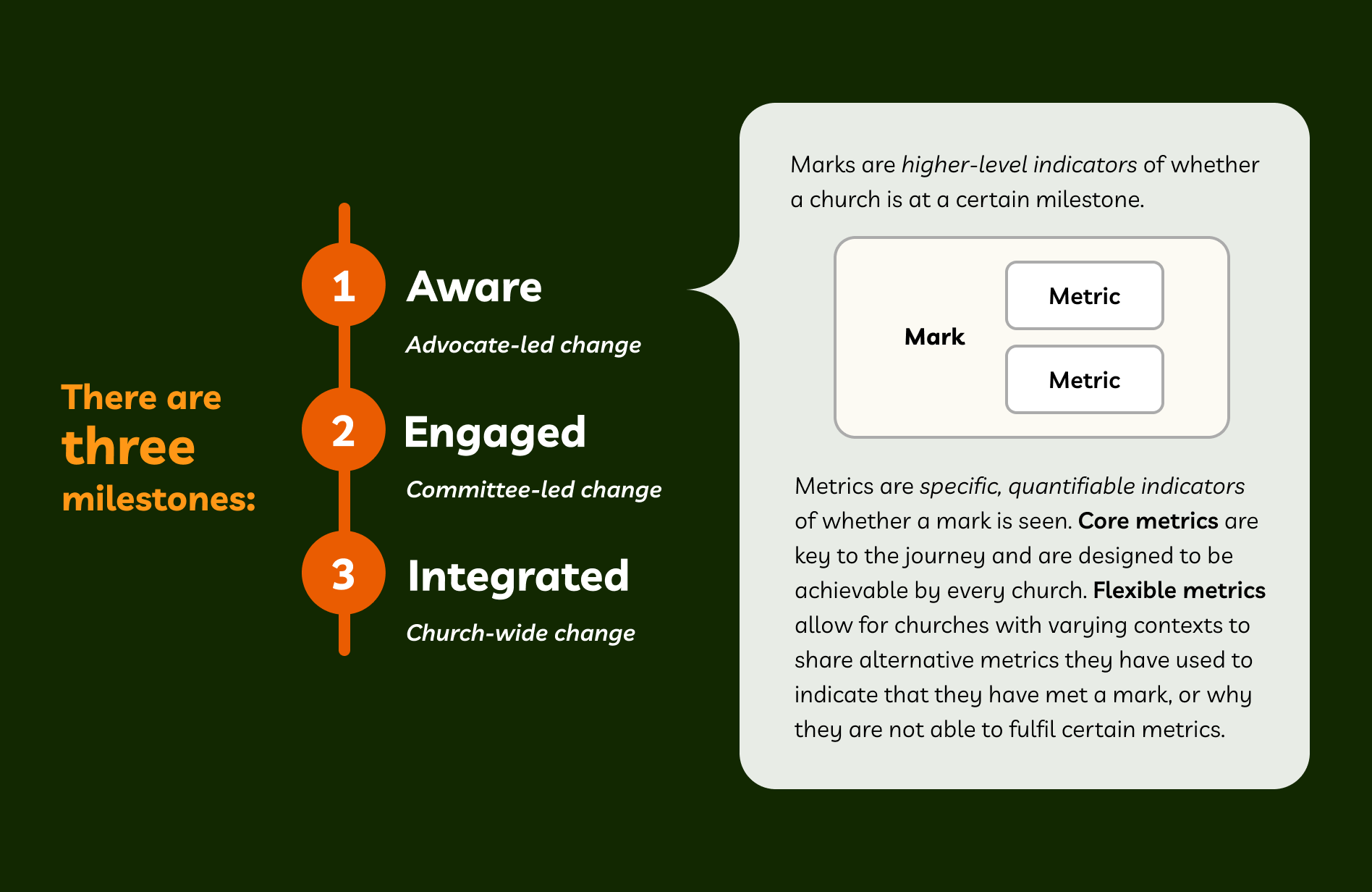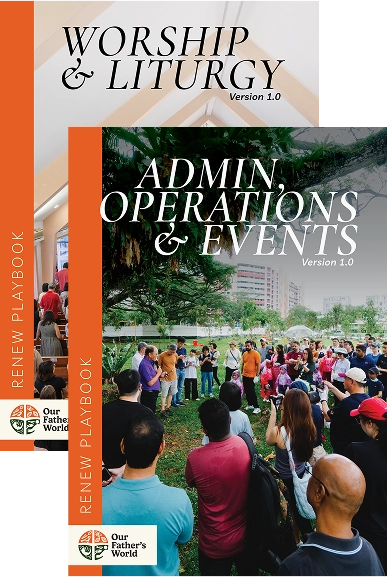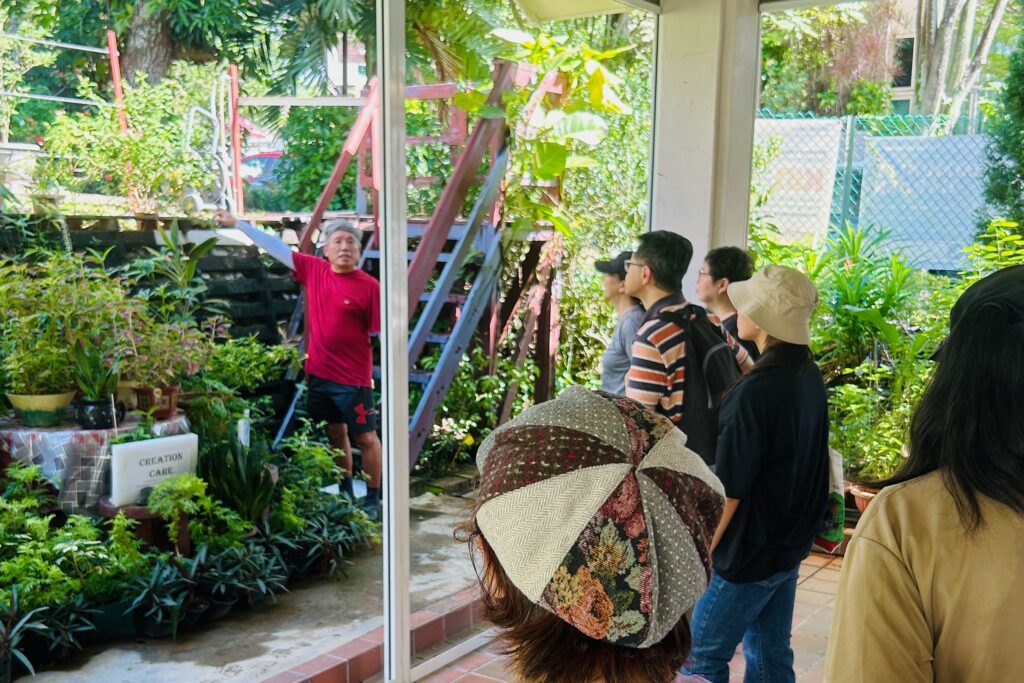RENEW
A Creation Care Discipleship Journey for Churches
RENEW is a guided discipleship journey for churches in Singapore to integrate creation care into individual and church life. It aims to renew one’s relationship with creation for right stewardship.
Use RENEW to bring your church on a journey towards a flourishing culture of caring for creation.
Start your RENEW journey
Indicate your interest
Have a chat with us
Register your church
Get the free RENEW Starter Kit
Work towards milestones
Be supported by RENEW Playbooks, Resources and Programmes
Report milestone completion
Celebrate your achievement!
Start your RENEW journey
Indicate your interest
Have a chat with us
Register your church
Get the free RENEW Starter Kit
Work towards milestones
Be supported by RENEW Playbooks, Resources and Programmes
Report milestone completion
Celebrate your achievement!
A structured roadmap towards transformed culture.
Caring for creation encompasses many actions, and can be overwhelming – use the RENEW Roadmap’s milestones and marks as goals to structure your journey.
The milestones aim to describe the state of a church’s creation care discipleship culture. Complete milestones by displaying all of its marks.


–
–
Aware
An Aware Church has a congregation that is aware of what caring for creation entails and its importance to God’s mission. Creation care is led by selected advocates.
See marks and metrics
Mark
Metric
Type
Creation is affirmed in the service.
At least 1 sermon on creation care preached before in the church.
At least 1 call to care for creation in a sermon every year.
At least 1 intercessory prayer a quarter for creation in the service.
Core
Flexible
Flexible
Congregants receive discipleship training in creation care.
At least 1 creation care discipleship initiative (e.g., talks, Bible studies, reflective walks) a year within church.
Congregants are regularly reminded to care for creation through the church’s communication channels (e.g., social media, physical posters).
Core
Flexible
Creation care advocates are identified within the church.
At least 2 creation care advocates are identified within the church. Advocates have initiated conversations and are together actively leading at least one creation care initiative.
Core
Engaged
An Engaged Church has basic buy-in from its congregation and leadership on creation care and its place in their church. A committee has been formed and is starting to mainstream creation care within the church.
See marks and metrics
Mark
Metric
Type
A creation care committee is formed, supported, and active.
The church formally sets up a creation care committee/ministry.
The committee is working with at least one other ministry in the church to integrate creation care practices into their ministry.
Core
Flexible
Church leaders and congregants have engaged more deeply in discipleship training in creation care.
Church leaders (e.g., board, elders, exco, council) have attended a talk, seminar, or workshop on creation care.
Most small groups in the church have completed a Bible study on creation care.
Most small group leaders in the church have attended a talk, seminar, or workshop on creation care.
Core
Core
Flexible
Congregants are provided with opportunities to care for creation.
At least 1 activity-based event/initiative is organised a year where participants are involved in caring for creation (e.g. fashion swaps, tree planting, cleanups).
Congregants are encouraged to take public transport to church.
For all church gatherings, the church encourages participants to use reusable crockery and cutlery.
For all church gatherings, the church encourages participants/ organisers to reduce, reuse, upcycle or recycle materials (e.g., decorations).
Congregants are encouraged to care for nature, whether in church, their homes, or in communal spaces.
Core
Flexible
Flexible
Flexible
Flexible
Integrated
An Integrated Church has a culture of caring for creation, and creation care is also embedded in its systems and processes. Creation care is integrated at the whole-of-church level.
See marks and metrics
Mark
Metric
Type
Church leadership commits to caring for creation.
The church leadership body adopts a statement to affirm the importance of creation and commits to caring for it.
A portion of the church’s annual budget is set aside for creation care.
Core
Core
Ministries across the church are engaged in caring for creation.
The creation care committee/ministry is actively working with at least 3 core ministries in the church to integrate creation care into their practice.
Most ministry leaders across the church have attended a talk, seminar, or workshop on creation care.
Selected preachers and teachers in the church have been identified who can confidently preach and teach about creation care.
Core
Core
Flexible
The church has concrete policies on creation care.
Energy, water and waste audits have been completed by the church, and the church is taking concrete steps to address the areas of improvements from those audits.
The church is actively working to implement recommendations in at least 2 RENEW Playbooks.
The church has committed to work towards carbon neutrality and has set short-term and long-term decarbonisation targets that they are actively working towards.
Core
Core
Flexible
Caring for creation has become part of congregants’ daily lives.
There is sustained growth in congregants’ engagement in at least 5 of the behaviours below, measured over 3 years. There should be at least 1 behaviour from each category reflecting various positive intended outcomes.
Category 1 - Nature Care
- Congregants are involved in the care of church land (e.g. through gardening).
- Congregants care for non-human creation in their neighbourhoods (e.g. home gardens, stray feeders).
- Congregants regularly take part in conservation activities (e.g. cleanups, clearing invasives).
Category 2 - Climate Action
- Most congregants take a fan-first approach to cooling spaces in their homes.
- Most congregants take a shared form of transportation to church (e.g. public transport, carpooling, shuttle bus).
- Most congregants make lifestyle changes to reduce their carbon footprint (e.g. eating less meat, avoiding fast fashion, reducing air travel).
Category 3 - Waste Elimination
- Congregants and staff often use reusable crockery or cutlery.
- Congregants often adopt waste reduction practices (e.g. upcycling, recycling, food practices).
- Congregants adopt water conservation practices (e.g. collecting rainwater, using water-saving fixtures).
- Congregants support local and ethical businesses (e.g. buying sustainable products for church events or personal use).
Category 4 - Advocacy
- Congregants are confident to share why they care for creation with others.
- Congregants share about creation care with their friends and family.
The church should track congregants' participation in these behaviours over a three-year period, ensuring there is sustained improvement in the behaviours.
Core
–
–
Aware
An Aware Church has a congregation that is aware of what caring for creation entails and its importance to God’s mission. Creation care is led by selected advocates.
See marks and metrics
Creation is affirmed in the service.
At least 1 sermon on creation care preached before in the church.
Core
At least 1 call to care for creation in a sermon every year.
Flexible
At least 1 intercessory prayer a quarter for creation in the service.
Flexible
Congregants receive discipleship training in creation care.
At least 1 creation care discipleship initiative (e.g., talks, Bible studies, reflective walks) a year within church.
Core
Congregants are regularly reminded to care for creation through the church’s communication channels (e.g., social media, physical posters).
Flexible
Creation care advocates are identified within the church.
At least 2 creation care advocates are identified within the church. Advocates have initiated conversations and are together actively leading at least one creation care initiative.
Core
Engaged
An Engaged Church has basic buy-in from its congregation and leadership on creation care and its place in their church. A committee has been formed and is starting to mainstream creation care within the church.
See marks and metrics
A creation care committee is formed, supported, and active.
The church formally sets up a creation care committee/ministry.
Core
The committee is working with at least one other ministry in the church to integrate creation care practices into their ministry.
Flexible
Church leaders and congregants have engaged more deeply in discipleship training in creation care.
Church leaders (e.g., board, elders, exco, council) have attended a talk, seminar, or workshop on creation care.
Core
Most small groups in the church have completed a Bible study on creation care.
Core
Most small group leaders in the church have attended a talk, seminar, or workshop on creation care.
Flexible
Congregants are provided with opportunities to care for creation.
At least 1 activity-based event/initiative is organised a year where participants are involved in caring for creation (e.g. fashion swaps, tree planting, cleanups).
Core
Congregants are encouraged to take public transport to church.
Flexible
For all church gatherings, the church encourages participants to use reusable crockery and cutlery.
Flexible
For all church gatherings, the church encourages participants/ organisers to reduce, reuse, upcycle or recycle materials (e.g., decorations).
Flexible
Congregants are encouraged to care for nature, whether in church, their homes, or in communal spaces.
Flexible
Integrated
An Integrated Church has a culture of caring for creation, and creation care is also embedded in its systems and processes. Creation care is integrated at the whole-of-church level.
See marks and metrics
Church leadership commits to caring for creation.
The church leadership body adopts a statement to affirm the importance of creation and commits to caring for it.
Core
A portion of the church’s annual budget is set aside for creation care.
Core
Ministries across the church are engaged in caring for creation.
The creation care committee/ministry is actively working with at least 3 core ministries in the church to integrate creation care into their practice.
Core
Most ministry leaders across the church have attended a talk, seminar, or workshop on creation care.
Core
Selected preachers and teachers in the church have been identified who can confidently preach and teach about creation care.
Flexible
The church has concrete policies on creation care.
Energy, water and waste audits have been completed by the church, and the church is taking concrete steps to address the areas of improvements from those audits.
Core
The church is actively working to implement recommendations in at least 2 RENEW Playbooks.
Core
The church has committed to work towards carbon neutrality and has set short-term and long-term decarbonisation targets that they are actively working towards.
Flexible
Caring for creation has become part of congregants’ daily lives.
There is sustained growth in congregants’ engagement in at least 5 of the behaviours below, measured over 3 years. There should be at least 1 behaviour from each category reflecting various positive intended outcomes.
Category 1 - Nature Care
- Congregants are involved in the care of church land (e.g. through gardening).
- Congregants care for non-human creation in their neighbourhoods (e.g. home gardens, stray feeders).
- Congregants regularly take part in conservation activities (e.g. cleanups, clearing invasives).
Category 2 - Climate Action
- Most congregants take a fan-first approach to cooling spaces in their homes.
- Most congregants take a shared form of transportation to church (e.g. public transport, carpooling, shuttle bus).
- Most congregants make lifestyle changes to reduce their carbon footprint (e.g. eating less meat, avoiding fast fashion, reducing air travel).
Category 3 - Waste Elimination
- Congregants and staff often use reusable crockery or cutlery.
- Congregants often adopt waste reduction practices (e.g. upcycling, recycling, food practices).
- Congregants adopt water conservation practices (e.g. collecting rainwater, using water-saving fixtures).
- Congregants support local and ethical businesses (e.g. buying sustainable products for church events or personal use).
Category 4 - Advocacy
- Congregants are confident to share why they care for creation with others.
- Congregants share about creation care with their friends and family.
The church should track congregants' participation in these behaviours over a three-year period, ensuring there is sustained improvement in the behaviours.
Core
Start your RENEW journey now.
Register to receive a free toolkit with a full roadmap checklist, as well as other resources for churches.
Participating Churches: 9
See churches who have achieved milestones below!
Aware Churches
Engaged Churches
Integrated Churches
Need more support?



Want to raise awareness?
Bring us to your church.
We give talks and workshops on the biblical basis for creation care, and how Christians can care for the world in their lives.
We also organise contemplative beach cleanups and reflective nature walks to bring us into and closer to creation.
Get in touch with us to arrange an activity for your church!
Integrating creation care into your church?
Use the Playbooks.
The RENEW Playbooks complement the Roadmap by providing tools for churches to care for creation on a ministry level.


Integrating creation care into your church?
Use the Playbooks.
The RENEW Playbooks complement the RENEW Framework by providing tools for churches to care for creation on a ministry level.
Want more guidance?
Get on our programmes.

Net Zero Church
Developed in reference to the World Resources Institute’s Science-based Targets for Faith guidelines, our Net Zero Church Programme aims to help Singaporean churches decarbonise. Churches will assess their resource usage and emissions impact and act on the findings.
Undertake this programme as a commitment to stewardship and care of creation.

Church Garden Network
Church gardening groups/ministries can join the network to share lessons, experiences and resources with the aim of building community, applying nature-positive gardening techniques, and helping churches who want to set up gardens to do so with confidence.
